My list of the year’s best and worst in cinema might be coming a little late “this year,” but, then, this was unlike any other “year” that preceded it – especially since, based on distribution schedules, it ended up being longer than 12 months and included offerings whose release dates differed markedly from what was originally planned. That’s played havoc with what’s been made eligible for “2020” awards consideration, given that some haven’t come out until 2021 while others originally debuted in 2019 but had their wide-scale distribution plans altered. Some films vying for 2020 awards consideration have not even gone into general release as yet. And, even though I have seen most of this year’s major releases and awards contenders, in the interest of full disclosure, I must confess that there are some offerings I haven’t screened thus far (and have not been considered in the compilation of this list).
So, with that said, here’s what made my Top 10 and Bottom 10 for “2020,” along with my 10 honorable and dishonorable mentions and a handful of other films that I’ve deemed noteworthy or forgettable. I have included both domestic and foreign offerings in these lists, but I have not included documentaries, as I will address those films in a separate blog entry.
Enjoy the list!
The Top 10 Countdown
10. “Blackbird” (USA/UK)
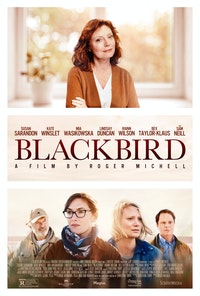
The right to die is one of those topics that tends to divide moviegoers along rigidly defined lines, and that’s very likely going to be the case when it comes to opinions about “Blackbird,” an American remake of the 2014 Danish offering “Silent Heart.” When a woman seriously afflicted with ALS sees what lies ahead for her, she decides to gather her family together for a final holiday celebration – and a celebration of life – as a prelude to ending her earthly existence. It’s a time to finish unfinished business, to say what’s gone unsaid and to reverently honor our power of choice. This touching, thought-provoking, deeply moving drama examines the dynamics within a family wrestling with this notion while honestly and lovingly addressing the heartfelt feelings associated with such a profound and intentional choice. While a few story elements don’t work quite as well as they probably could have, most of the narrative is handled sensitively and realistically, all brought to life by the superb performances of its stellar ensemble, particularly Susan Sarandon, Sam Neill, Mia Wasikowska and Lindsay Duncan. Director Roger Michell’s latest will obviously disturb some viewers, but others, like yours truly, will be deeply moved – and poignantly reminded that what we do with our lives (especially in the now) is up to us and no one else’s business.
9. “God of the Piano” (Israel)
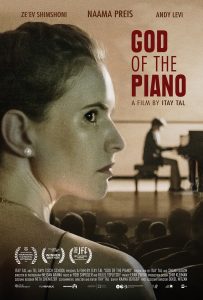
This taut psychological thriller about a gifted pregnant pianist who wants the family’s musical legacy to be carried on through her unborn son takes a dramatic twist when the child is born deaf, prompting his obsessive mother to take drastic steps to keep the dream alive. Israeli director Ital Tal’s debut feature packs quite a suspenseful punch in its 80-minute runtime, especially in its remarkable ability to move the story along more by deeds than words. The film’s excellent ensemble and superb score (much of it original) bring this captivating and compelling story to life, keeping viewers on the edge of their seats right up to the end. A surprising gem of a movie that’s well worth your time.
8. “The Forty-Year-Old Version” (USA)
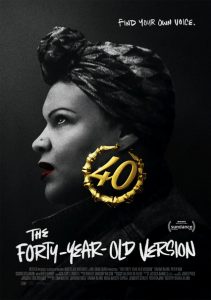
Web site. Trailer. Blog (to come).
Critics Choice Awards – nominee, best comedy
Independent Spirit Awards – nominee, best first feature
National Board of Review – winner, Spotlight Award (Radha Blank), Top 10 Films
When a 39-year-old playwright’s career has woefully stalled for a decade, what does she do to get it back on track before turning 40? She decides to reinvent herself and become a rapper, one whose works reflect the views of a 40-year-old plus-size single Black woman struggling to get by – and with hilarious (and I do mean hilarious) results at that. The debut feature from writer-actor-director Radha Blank is one of the most refreshingly honest comedies to come along in quite some time, serving up big laughs throughout its two-hour runtime while simultaneously offering poignant insights about the New York theater community, society at large, being authentic with oneself and growing older. The narrative becomes admittedly a little stretched out in the second hour, but, with everything else it has to offer, who cares? Sensitive viewers are cautioned that the salty language in this one is enough to make a sailor blush, but it only serves to make the laughs even bigger throughout. Blank is off to a tremendous start with this project; let’s hope she keeps it up in future releases.
7. “Apples” (“Mila”) (Greece/Poland/Slovenia)
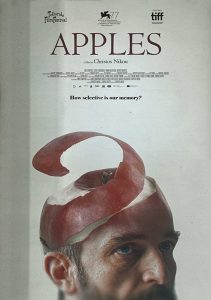
National Board of Review – winner, Top 5 Foreign Films
Director Christos Nikou is off to a fine start with his debut feature about an amnesia sufferer who struggles with trying to get his memory back while simultaneously attempting to get on with his life in case he can’t. This suspenseful, nuanced and engaging meditation on the nature of memory and the selectivity of its retention will keep viewers guessing from start to finish, all the while serving up heaping helpings of wry humor and cleverly dangling clues before our eyes that may or may not prove integral to solving the mystery of this intriguing conundrum. The film mirrors the eccentricity of directors like Yorgos Lanthimos and Charlie Kaufman, presents a puzzle not unlike that found in Christopher Nolan’s “Memento” (2000), and successfully incorporates the kind of deadpan laughs characteristic of releases like Hal Ashby’s “Being There” (1979). The film’s inventive, tautly assembled script, written by Nikou and Stavros Raptis, deservedly captured the Chicago Film Festival’s Silver Hugo Award for best screenplay. Indeed, if this is what Nikou has to offer in his first major outing, I can’t wait to see what he comes up with next.
6. “There Is No Evil” (“Sheytan vojud nadarad”) (Iran/Germany/Czech Republic)
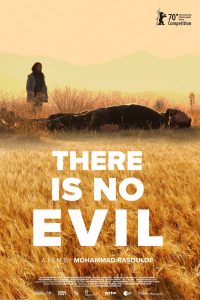
“Remorse,” “regret” and “defiance” are words most of us would not readily associate with executioners, but they’re more than apropos when it comes to the characters in director Mohammad Rasoulof’s latest, “There Is No Evil.” This collection of four vignettes about the lives of executioners placed into situations bigger than themselves examines how these individuals cope with their circumstances, revealing feelings that those in this grim profession aren’t supposed to possess. While there are occasional pacing issues and a slight tendency for the filmmaker to wear his heart on his sleeve, these minor flaws are easily overlooked in the wake of the picture’s numerous other strengths. A surprisingly insightful offering.
5. “The Trial of the Chicago 7” (USA/UK/India)
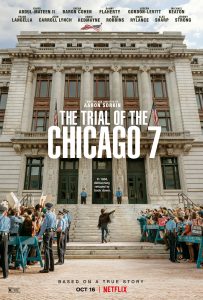
Golden Globe Awards – winner, best screenplay
Golden Globe Awards – nominee, best dramatic picture, best director, best original song, best supporting actor (Sacha Baron Cohen)
Screen Actors Guild Awards – nominee, best cast, best supporting actor (Sacha Baron Cohen)
American Film Institute – winner, Movie of the Year
Critics Choice Awards – nominee, best picture, best director, best original screenplay, best editing, best acting ensemble, best supporting actor (Sacha Baron Cohen)
While this superb docudrama takes some liberties with the facts of this landmark court case, writer-director Aaron Sorkin’s latest offering gets much of it right, with what it invents making for some damn good theater. Admittedly, the picture is a tad talky in the first half hour, but that shortcoming is covered well by the film’s stellar cast, including Sacha Baron Cohen, Mark Rylance, Eddie Redmayne, Jeremy Strong, John Carroll Lynch, Frank Langella, Joseph Gordon-Levitt and Michael Keaton. And, once the picture hits its stride, it’s a compelling watch from that point forward. The relevance of this story is by no means lost in light of the current sociopolitical climate, and the picture’s October 2020 release couldn’t have been more serendipitous. This is one we should all see – and make a point of embracing its message.
4. “One Night in Miami…” (USA)
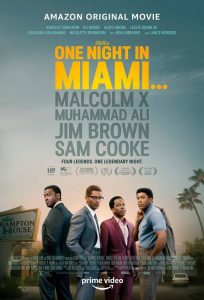
Golden Globe Awards – nominee, best director, best original song, best supporting actor (Leslie Odom Jr.)
Screen Actors Guild Awards – nominee, best cast, best supporting actor (Leslie Odom Jr.)
American Film Institute – winner, Movie of the Year
Critics Choice Awards – nominee, best picture, best director, best adapted screenplay, best original song, best acting ensemble, best supporting actor (Leslie Odom Jr.)
Independent Spirit Awards – winner, Robert Altman Award, best ensemble cast
National Board of Review – winner, Freedom of Expression Award
Based on Kemp Powers’s play by the same name, filmmaker Regina King’s directorial debut about a historic 1964 meeting among activist Malcolm X, boxing great Cassius Clay, football star Jim Brown and singer-producer Sam Cooke on the night of Clay becoming world champ explores the state of the civil rights movement at the time and how each of them viewed its future and their role in it. This captivating look at the movement from the inside presents a balanced examination of the four friends’ views on the subject, including both their areas of concurrence and disagreement and how those pointed opinions had the potential to either tear them apart or bring them together. The excellent ensemble cast of Kingsley Ben-Adir, Eli Goree, Aldis Hodge and Leslie Odom Jr. enlivens the superbly penned screenplay, giving the picture a crackling intensity that’s tautly sustained throughout. And, despite a few stagey segments, this is arguably one of the best theatre-to-screen translations I’ve ever seen, effectively opening up the source material and giving it breathing room that such adaptations often lack. King has indeed produced a magnificent work here, handily serving up the right picture for our times, one that gives us all much to ponder in terms of where we are and where we go from here.
3. “Sound of Metal” (USA)
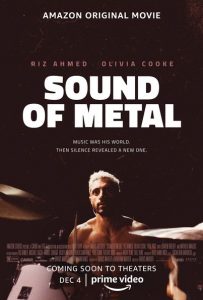
Golden Globe Awards – nominee, best dramatic actor (Riz Ahmed)
Screen Actors Guild Awards – nominee, best dramatic actor (Riz Ahmed)
American Film Institute – winner, Movie of the Year
Critics Choice Awards – nominee, best picture, best original screenplay, editing, best actor (Riz Ahmed), best supporting actor (Paul Raci)
Independent Spirit Awards – nominee, best first feature, best actor (Riz Ahmed), best supporting actor (Paul Raci)
National Board of Review – winner, Top 10 Films, best actor (Riz Ahmed), best supporting actor (Paul Raci)
When our dreams and the life we know evaporate in an instant, we may find it next to impossible to adjust, as is the case in this engaging drama about a heavy metal drummer who is faced with losing his hearing. While this offering has a little trouble finding its footing at times, it nevertheless takes audiences through the challenges associated with hearing loss and a recovering addict’s struggle to maintain sobriety in the wake of profound change. The film also skillfully delves into matters of adaptability and self-acceptance, as well as learning how to see “disabilities” as differences, not handicaps, qualities with the potential to give us new and unconsidered perspectives on life. All of this is brought to life through the fine performances of Riz Ahmed, Olivia Cooke and Paul Raci, as well as an inventive sound design that truly makes an impact on viewers. Director Darius Marder’s debut narrative feature is one of the year’s best.
2. “Two of Us” (“Deux”) (France/Luxembourg/Belgium)
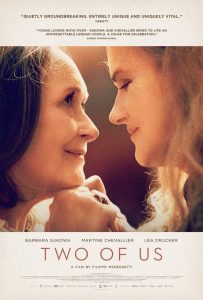
Web site. Trailer. Blog (to come)
Golden Globe Awards – nominee, best foreign language film
Critics Choice Awards – nominee, best foreign language film
How and who we love has undergone tremendously liberating changes in recent years, but, for some seniors, who remember a time when such taboos could not be revealed, the past painfully lingers on into the present. So it is for an aging French woman who is unable to bring herself to tell her adult children about her lesbian partner, leaving her longtime lover on the sidelines when a tragic event disrupts their happiness and lives together. Director Filippo Meneghetti’s debut narrative feature is an intensely gripping and moving work, one that grabs viewers by the collar and makes the frustration experienced by its protagonists truly palpable – and infuriating. The superb performances by Barbara Sukowa and Martine Chevallier are riveting and heartfelt, achieving powerful impact with gestures as simple as facial expressions and piercing views into their eyes. There are a few incidents in the narrative that seem a bit far-fetched, but they’re compensated for by everything else this release has to offer. The pain, romance and warmth of this one must be experienced by anyone with a conscience – or a pulse – to see that, no matter how far we have come, there’s always more ground still to be made up when it comes to openly express our feelings for the one we love.
1. “Minari” (USA)
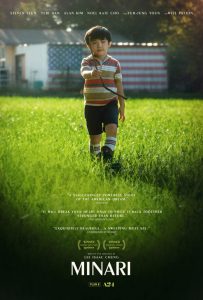
Web site. Trailer. Blog (to come)
Golden Globe Awards – winner, best foreign language film
Screen Actors Guild Awards – nominee, best cast, best actor (Steven Yeun), best supporting actress (Yuh-jung Youn)
American Film Institute – winner, Movie of the Year
Critics Choice Awards – nominee, best picture, best foreign language film, best director, best original screenplay, best cinematography, best score, best acting ensemble, best actor (Steven Yeun), best supporting actress (Yuh-jung Youn), best young actor/actress (Alan S. Kim)
Independent Spirit Awards – nominee, best feature, best director, best screenplay, best actor (Steven Yeun), best supporting actress (Yuh-jung Youn), best supporting actress (Yeri Han)
National Board of Review – winner, Top 10 Films, best original screenplay, best supporting actress (Yuh-jung Youn)
This is the movie that should win the Oscar for best picture, flat out, hands down, no questions asked. Director Lee Isaac Chung’s heartfelt domestic drama about a South Korean immigrant family seeking a fresh start and a better tomorrow in 1980s rural Arkansas is just the kind of movie that we need right now, much as “Moonlight” was the film we needed in 2016. The picture’s exquisite cinematography, nuanced script and narrative, and superb ensemble cast make for a moving cinematic experience that leaves viewers with a warm glow that lasts long after the movie’s final frame. Richly deserving of the many accolades and award nominations it has received thus far, “Minari” truly stands out among this year’s field of contenders, masterfully and lovingly handled in virtually every respect. I can’t speak highly enough about the quality of this film and its power to help heal an ailing nation.
Honorable Mentions
11. “Driveways” (USA)
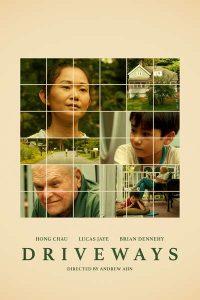
Independent Spirit Awards (2020) – nominee, best first screenplay, best actress (Hong Chau)
National Board of Review (2021) – winner, Top 10 Independent Films
A gentle, touching story about a lonely 8-year-old boy and his single mother who travel out of town to empty the house of a recently deceased relative and end up befriending their late relation’s next-door neighbor, a widowed 80-something Korean War vet. This moving tale exudes warmth as the three lonesome protagonists grow close to one another, filling a huge void in each other’s lives. However, director Andrew Ahn’s latest is far from an exercise in schmaltz or obvious manipulation. Though some of the picture’s themes are familiar, they’re often handled in unconventional ways and always addressed with deft skill and subtlety. There are a few elements that could have used a little further development, and the ending – though effective – seems to come somewhat suddenly. However, these shortcomings aside, “Driveways” is a genuine pleasure, especially for its performances (most notably that of Brian Dennehy in one of his last roles). It’s a fine offering worthy of its two 2020 Independent Spirit Award nominations, now available for streaming online.
12. “I Care a Lot” (UK)
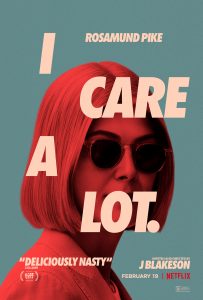
Web site. Trailer. Blog (to come)
Golden Globe Awards – winner, best comedic actress (Rosamund Pike)
Seeing the ugly truth exposed in all its vile splendor may be hurtful and shocking, but sometimes it’s a necessary wake-up call for the betterment of our collective well-being, as this cynical, darkly satirical comedy and social commentary illustrates on the nature of predatory capitalism. When the owner of a shifty legal guardianship agency adept at fleecing wealthy seniors afflicted with mental health issues meets her match in an equally crafty nemesis with nefarious connections, a war of wits breaks out for domination and control of the situation, regardless of who might get hurt in the process. While the film starts to go off the rails somewhat in the second half, its wicked humor makes clear the ruthlessness inherent in the practices of this economic system, both on a personal and a global geopolitical scale. What makes the film, though, are its superb performances, especially those of Rosamund Pike, Dianne Wiest and Peter Dinklage. Some may find the content and message of director J Blakeson’s latest offering troubling, but that’s simply the movie doing its job. It stresses the need for us to shed our Pollyanna attitudes about fairness in business and money matters, no matter how disillusioning that might be. Indeed, it reminds us of the old adage that it’s easier to fool people than to convince them that they’ve been fooled.
13. “Someone Somewhere” (“Deux moi”) (France/Belgium)

How refreshing it is to see an intelligent romantic comedy that entertains and enlightens while successfully breaking all the rules of the genre. The latest offering from French director Cédric Klapisch serves up a warm, funny, smartly written tale that presents fresh, realistic insights on romance without ever becoming schmaltzy or saccharinely sentimental. Leads François Civil and Ana Girardot turn in fine, exceedingly natural performances that are totally believable and never stretch credibility. And then there’s the cinematography, which shows off the beauty of the French Alps and aspects of Paris probably never seen by most outsiders. The film takes viewers on quite an emotional journey on its way to its climax, but the trip is well worth it, providing the basis for a joyful and satisfying conclusion. This is a truly terrific film – don’t miss it.
14. “The Columnist” (“De kuthoer”) (Netherlands)

In an age when anyone seems to feel he or she can say anything about anyone on social media without retribution, it’s easy to understand how someone aggrieved might lose it and want to fight back. So it is for the columnist of a popular Dutch periodical who comes under attack from all directions in an assault of unfair (and patently untrue) cyber-bullying – that is, until she decides to fight back using more than just her words. This expertly directed, superbly well-acted macabre comedy packs quite a laugh- and horror-filled punch, skillfully knowing when to push the tastefulness envelope and when to pull it back, all tinged with just the right amount of camp and social commentary. There is a slight tendency toward heavy-handedness in a few spots, especially near the end, but director Ivo van Aart’s skillful hand keeps it from getting out of control and turning into a lecture. A real Dutch treat that shouldn’t be missed.
15. “Cicada” (USA)

A heart-wrenching look at how two gay male partners in an interracial relationship work together at solving their respective past traumas and how the power of love can significantly aid and smooth the process. This fact-based dramatic love story, written and directed by protagonist Matthew Fifer, is peppered with inventive and whimsical touches of comic relief and featuring an excellent ensemble cast (especially Cobie Smulders as a kooky unconventional therapist) and moves viewers deeply, earning every single bit of empathy that it draws out of audiences. Easily one of the most endearing and honest love stories I’ve ever seen, sexual orientation aside. Don’t miss this one – my top pick from the Reeling Chicago International Gay Film Festival.
16. “Divine Love” (“Divino Amor”) (Brazil/Uruguay/Chile/Norway/Sweden/Denmark)
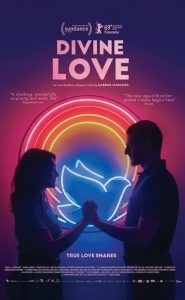
In a Brazil of the near future in which fundamentalist Christianity has insidiously ingratiated itself into what is still a supposedly secular state, elements of the church and its ideology have intrusively invaded virtually every aspect of everyday life, affecting the rights of everyone, including non-believing “infidels.” A society that has welcomed ecclesiastical discos and drive-through pastoral advice centers into its midst has also become one tinged with the faith’s contemporary bureaucracy and beliefs about blasphemy. It’s also one in which unbridled sexuality has been hypocritically rationalized into existence as part of its alleged sacred doctrines. But what happens when those “values” become toppled by unexpected and seemingly miraculous events that don’t jibe with its dogma? That’s what director Gabriel Mascaro’s wickedly biting satire exposes, a humorous but stern cautionary tale of what can happen when religious conformity threatens to become so pervasive that it presents a clear and present danger to a nation’s citizenry. As is the case with many of Mascaro’s films, this offering includes a number of protracted and explicit sex sequences, so sensitive viewers be warned, but their inclusion is all part of the phony piety that goes into the rituals, practices and beliefs of a faith-based movement that essentially rings hollow and deserves to be exposed as such.
17. “The Weasels’ Tale” (“El cuento de las comadrejas”) (Argentina/Spain)
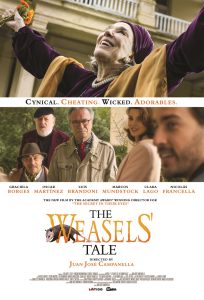
When two millennial con artists take on four movie industry veterans past their prime, the plot thickens as everyone tries to outhustle one another. It doesn’t matter that the once-famous cinema idols are essentially financially destitute and live on a decrepit estate that’s falling apart and overrun by the local wildlife – everybody’s still out to look after himself or herself first. This deliciously devious dark comedy is filled with devilish twists and turns, nicely seasoned with snappy writing, creative photographic effects, superbly campy performances, a spot-on soundtrack and a story line where art imitates life (and vice versa). Director Juan José Campanella’s latest sizzles throughout, nicely paced and crisp in virtually every frame, including those that slyly poke fun at the movie industry through the picture’s narrative. A hilarious morality play that’s a genuine joy from start to finish.
18. “The Last Full Measure” (USA)
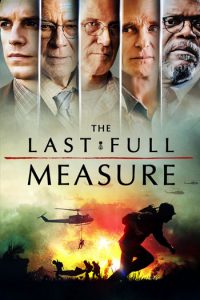
Now here’s a movie that really got the shaft: Between being released in the typical cinematic wasteland that is January (instead of the genuinely more fitting year-end awards season window) and a barrage of smarmy negative reviews by ever-so-cynical critics who are probably too young to remember the horrors of Vietnam (if they were even born during that time), this moving, heartfelt, fact-based story about the efforts to earn a posthumous Medal of Honor designation for a brave Air Force medic killed while saving countless soldiers during one of the bloodiest battles of the war earns every bit of respect and emotion that it brings out of its viewers. With an excellent ensemble cast featuring superb performances by William Hurt, Samuel L. Jackson, Ed Harris, Christopher Plummer and Peter Fonda (in his final performance), director Todd Robinson’s stirring tale tells a compelling, no-nonsense story about heroism, valor and sacrifice and the quest to see those qualities properly recognized (especially since the 30-year delay in doing so was derailed by bureaucratic incompetence and a concerted effort to cover up some dirty little military secrets). Be forewarned that the film contains graphic images that may not be suitable for more sensitive viewers, but the picture never becomes gratuitous in its depictions of wartime events. To be sure, this offering certainly deserved better than it got, both in terms of its distribution schedule and its critical reception. And that’s ironic, for this release ultimately suffered from the same shoddy treatment as its principal subject, a wrong that truly should be made right.
19. “The Life Ahead” (“La vita davanti a sé”) (Italy)
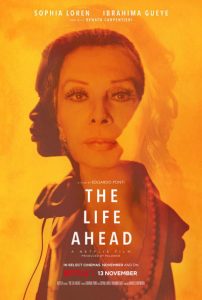
Golden Globe Awards – winner, best original song
Golden Globe Awards – nominee, best foreign language film
Critics Choice Awards – nominee, best foreign language film, best original song, best young actor/actress (Ibrahima Gueye)
Though occasionally somewhat predictable and formulaic, this touching tale about a Holocaust survivor and former streetwalker who takes in and cares for orphans and other cast-aside children shines brilliantly thanks to its outstanding performances and the palpable chemistry of its superb ensemble cast members. As a streetwise, tough-loving mother figure, veteran actress Sophia Loren (in her first feature film role in 10 years) provides a perfect counterpart to a troubled 12-year-old Senegalese immigrant street child played by newcomer Ibrahima Gueye, helping him find his way and giving him the love, nurturing and support he so desperately needs. Director Edoardo Ponti (Loren’s son) serves up a fine effort in his third feature outing. The story here may seem a little familiar at times, but its execution more than makes up for that, with the 87-year-old Loren adding yet another memorable performance to her storied career.
20. “Beasts Clawing at Straws” (“Jupiragirado japgo sipeun jimseungdeul”) (South Korea)
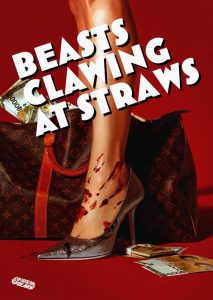
When the films of the Coen Brothers meet those of Bong Joon-Ho, you’ve got the work of first-time South Korean director Kim Yong-hoon, whose debut feature, “Beasts Clawing at Straws,” is an absolute knock-out. This dark crime comedy consistently delivers big laughs, punctuated by a plethora of twists and turns, all brought to life by a superb ensemble of performers who create memorable and colorful characters. The picture has a slight tendency to drag in a few spots, but this is easily overlooked in light of its many, many other strengths. If this picture is any indication of what the filmmaker has in the tank, we can look forward to a bright future of entertaining and engaging releases. Don’t miss the opportunity to see the launch of what is hopefully a promising career.
Noteworthy (in no particular order)
“Nomadland” (USA/Germany). Web site. Trailer.
“The Outside Story” (USA). Web site. Trailer. Blog.
“My Dog Stupid” (“Mon chien Stupide”) (France/Belgium). Web site. Trailer. Blog.
“Song Without a Name” (“Canción sin nombre”) (Peru/Spain/USA/Chile). Web site. Trailer. Blog.
“Bacurau” (Brazil/France). Web site. Trailer. Blog.
“Twilight’s Kiss” (“Suk Suk”) (Hong Kong). Web site. Trailer.
“To the Stars” (USA). Web site. Trailer. Blog.
“Papicha” (France/Algeria/Belgium/Qatar). Web site. Trailer. Blog.
“New Order” (“Nuevo orden”) (Mexico/France). Web site. Trailer.
“The Climb” (USA). Web site. Trailer.
“Da 5 Bloods” (USA). Web site. Trailer.
The Bottom 10 Countdown
10. “Family Members” (“Los miembros de la familia”) (Argentina)
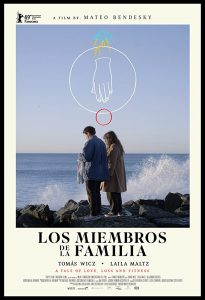
Despite some modestly interesting characters and occasionally intriguing ideas, director Mateo Bendesky’s rambling, minimalist, surreal drama-comedy (a term I’d use very loosely) never (and I do mean never) finds any meaningful traction. While billed as a coming of age/coming out tale with a metaphysical twist (dressed up in a largely snide, smarmy package), this utterly strange, totally directionless mess ambles along toward a hoped-for payoff that’s never reached. Don’t waste your time.
9. “The Midnight Sky” (USA)
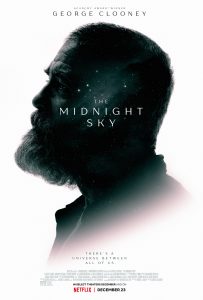
Golden Globe Awards – nominee, best original score
Critics Choice Awards – nominee, best score, best visual effects, best young actor/actress (Caoilinn Springall)
National Board of Review – winner, Top 10 Films
Despite an intriguing premise, flashy special effects and a few touching dialogue exchanges, this overlong bittersweet sci-fi offering about an Arctic scientist trying to warn a returning astronaut crew about an unfolding global catastrophe that’s wiping out the earth’s population trudges along at a glacial pace, subjecting viewers to a litany of cinematic sins as it limps toward its conclusion. Among those transgressions are uneven pacing, implausible action sequences, occasionally odd and inexplicable editing, poor handling of the connection between its two principal narrative threads, unbridled predictability, and a wealth of extraneous material that could have been easily snipped. But perhaps the worst offense is director George Clooney’s boring treatment of the story; it simply lacks the gripping, dramatic nature necessary to make this material work effectively. A major disappointment.
8. “H is for Happiness” (Australia)
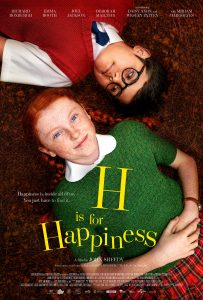
This tweener/young adult tale about an Australian schoolgirl’s noble attempt to save her dysfunctional family from falling apart may have its intentions in the right place, but it most definitely lacks the inherent coherency to make the picture work. Its inconsistent tone, which ranges from delightfully whimsical to annoyingly cheerful to darkly real, leaves viewers often mystified about what it’s trying to say, how it’s trying to say it and, ultimately, why anyone should even care. The look and feel are reminiscent of Tim Burton but without the edge, except for those rare occasions where it goes so completely over the top that it takes its audience unexpectedly into territory seemingly inappropriate for those of an impressionable age. As the story ambles through its choppy, often-incongruous narrative, it’s easy to lose interest in the characters and plot (and not too far into the film either, I might add). Save for some modestly touching moments in the last half hour, there’s precious little to admire here. It’s indeed baffling trying to figure out what director John Sheedy and screenwriter Lisa Hoppe were going for here, but, whatever it was, they sorely missed the mark.
7. “Summer of ʼ85” (“Été 85”) (France/Belgium)
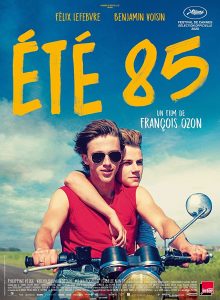
Writer-director François Ozon’s utterly preposterous, vanilla-encrusted “forbidden gay romance” tale is so unbelievably dated and clichéd that it’s unfathomable anyone would have wanted to back this project. With a narrative that plays like so many “homosexual dramas” of the ʼ60s and ʼ70s in which something bad inevitably happens to someone just by virtue of being gay, “Summer of ʼ85” is a trite throwback to those cautionary tales of yore (and, even at that, it’s almost totally lacking in the suspense that made some of those stunningly judgmental, overly prejudicial releases at least somewhat entertaining in their own excessively intolerant way). There is something of a modest camp factor present here, but not nearly enough to make this the parody of those old melodramas that it could have been. Skip this one at all costs.
6. “Save Yourselves!” (USA)
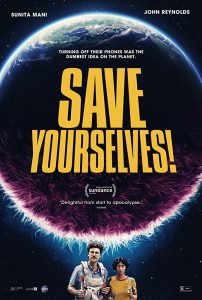
What’s been billed as a hip comedy about a millennial couple trying to personally reconnect with one another in the midst of an alien invasion they know nothing about may be incisive in its social commentary, but it’s virtually devoid of laughs (so where is the comedy?). This overly talky, slowly paced, hyper-analytical debut feature from directors Alex Huston Fischer and Eleanor Wilson is about as entertaining as a root canal. And the real shame here is that this could have been an excellent premise for being both observant and funny. “Save Yourselves!” may indeed be an appropriate title, but mainly as an admonition to would-be viewers to stay away and save themselves the price of admission.
5. “First Cow” (USA)
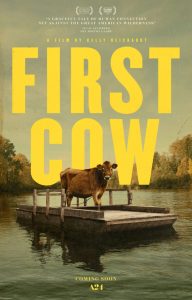
Critics Choice Awards – nominee, best adapted screenplay, best cinematography
Independent Spirit Awards – best feature, best director, best supporting actor (Orion Lee)
National Board of Review – winner, Top 10 Films
I’ve seen life insurance infomercials that were more captivating than this interminably tedious slog. Director Kelly Reichardt’s latest starts out slow and goes downhill from there, telling a story about 19th Century fortune seekers in Oregon Territory that has nothing interesting to say. I’m at a loss to understand why this offering (or most of the filmmaker’s other pictures, for that matter) garner such appeal from critics and diehard fans. While some of the cinematography is indeed gorgeous, much of the film is underlit, and the sound quality is atrocious, making it difficult to understand much of what the characters are mumbling (most of which turns out to be rather inconsequential at that). How this is ending up on so many top 10 lists and receiving so much awards season buzz is totally beyond me.
4. “Wonder Woman 1984” (USA/UK/Spain)

Critics Choice Awards – nominee, best visual effects
Yikes, what a disappointment! This much-anticipated action adventure release misses the mark in so many ways that it’s easy to lose count. The story is frequently derivative, the script plays like it was written by a committee, the action sequences aren’t especially engaging (and a little slow in coming), there are plot holes aplenty, the symbolism is obvious and heavy-handed, there is little to characterize the story (visually or thematically) as to the significance of its 1984 setting, and on and on and on it goes in endlessly lame ways. To be sure, Kristen Wiig delivers a fine supporting performance as a fence-straddling villain, and there are some nice sentiments worked in during the film’s closing moments. But, compared to this film’s far superior predecessor, director Patty Jenkins’s ambitious but disjointed and flawed offering represents a big step backward for the franchise and its future (especially at a time when it can ill afford it). And, by the way, what’s with that outfit Ms. Wiig wears in the closing sequence? It looks like a wardrobe reject from the movie version of “Cats.”
3. “Malcolm & Marie” (USA)
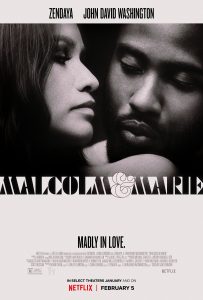
Web site. Trailer.
Critics Choice Awards – nominee, best actress (Zendaya)
Watching this truly abysmal relationship drama is akin to witnessing a horrific traffic accident play out over the course of nearly two hours. As a self-important, self-indulgent, self-aggrandizing vehicle for writer-director Sam Levinson, this 15-round knock-down, drag-out lover’s quarrel with no referee grows tedious and exhausting quickly as the film’s two protagonists spew buckets of bile at one another through myriad monologues delivered with flawless articulation and an artificial eloquence that defy believability. Though stylishly filmed in black and white with earnest performances by Zendaya and John David Washington and a fine (though occasionally all-too-obvious) soundtrack, the picture nevertheless rings inauthentic virtually from the outset with a narrative that becomes circular and characters who grow ever more reprehensible as the picture wears on. One can’t help but wonder, “Why are these two people together?” And, as their bombastic and whiny arguing drones on and on, it probably wouldn’t take much for the average moviegoer to yell “Shut the hell up!” at the screen. Without a doubt one of the most frustrating, annoying, tiresome and pretentious offerings I’ve seen in a long time.
2. “Stardust” (UK)
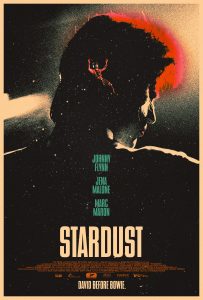
The prospects for a picture about a historical figure don’t bode well when the opening frame unapologetically proclaims that what follows is mostly fiction. So it is with “Stardust,” an alleged “origin story” about a young David Bowie seeking to launch his career in America on a 1971 promotional tour plagued by problems, many of which originate with the rising rock star himself. But, given the opening disclaimer, how much of it is true? And, because of that, without further credible attribution, why should any of us care? Add to that a host of underdeveloped story threads, precious little music (including absolutely no Bowie compositions due to a rights issue), and, perhaps most critically, a cogent explanation of exactly how Bowie developed his alter-ego Ziggy Stardust, and you’ve got a mess of a movie that’s all over the map. To be sure, the capable performances of Johnny Flynn, Marc Maron and Jena Malone help to make up for these shortcomings somewhat. However, given the iconic talent that David Bowie was, he and his fans certainly deserve a better treatment of his life and accomplishments than what’s presented in director Gabriel Range’s sorely disappointing effort.
1. “Palm Springs” (USA/Hong Kong)

Golden Globe Awards – nominee, best comedy picture, best comedy actor (Andy Samberg)
Critics Choice Awards – nominee, best comedy
Independent Spirit Awards – nominee, best first screenplay
Never have I been as anxious to await a movie’s ending as I was while watching this waste of good celluloid. This truly awful knock-off of “Groundhog Day,” mixed with elements of silly sex comedies, kitchen table metaphysics, lame self-help suggestions and stabs at the kind of obligatory insipid dramatic sequences typically found in cheesy rom-coms, lost my interest about 10 minutes in and never got it back during its torturously overlong 90-minute runtime. It’s truly astounding how this inane project ever got greenlighted and managed to attract performers like J.K. Simmons, June Squibb and Peter Gallagher (let alone capture multiple unearned awards season nominations), but I can honestly say that I never laughed once – not once – during first-time feature director Max Barbakow’s stupendously inept comedy. The cloying, over-the-top performances of Andy Samberg and Cristin Milioti are headache-inducing and unenduringly annoying, making me wonder what anyone could possibly see in this cinematic monstrosity. I implore you to avoid this mess at all costs.
Dishonorable Mentions
11. “Luz” (USA)

What begins as a cellmate friendship turns into a prison romance in which the partners must cope with their circumstances when paroled (and separated) at different times, a situation that becomes further complicated once both are in the outside world again. Unfortunately, despite this mildly intriguing premise, director Jon Garcia’s overlong offering gets bogged down in subplots that are never fully developed and/or descend into the depths of predictability. I couldn’t wait for this one to end and to see what neat, tidy wrap-up it would employ before the credits rolled (something my eyes were already doing throughout much of the film’s second half).
12. “Careless Crime” (“Jenayat-e bi deghat”) (Iran)
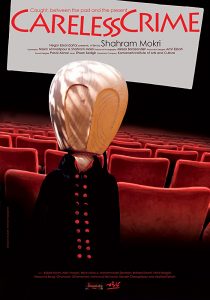
Handily one of the most audaciously pretentious pieces of cinematic crap I have seen in ages. “Based” on a tragic act of arson in an Iranian moviehouse shortly before the 1979 overthrow of the Shah – a premeditated terrorist attack on so-called decadent Western cultural influences – “Careless Crime” echoes that story and sentiment in a modern-day theater presenting a film by the same name. That movie-within-a-movie, in turn, echoes the lives of present-day theater owners and patrons attending a screening that has been targeted for attack by a quartet of contemporary arsonists, while also giving nods to the anniversary of the 1979 moviehouse incident, creating a multi-layered, folded-over time loop involving the integration of the three primary story threads. I found director Shahram Mokri’s overly glib, too-clever-for-its-own-good offering to be stunningly baffling, frequently pointless, and, frankly, lacking in respect for the original tragedy. I might have cut this film more slack if it weren’t directly referencing an actual event in which nearly 500 people lost their lives, but a project that so cavalierly springboards off of a tragedy like that just leaves a bad taste in my mouth, as I would think it should for most viewers (that is, those who’d be willing to waste 2:15 of their lives watching this celluloid mess). Add to that some rather cheesy production values and a desperate need for excessive editing, and you’ve got something that’s really not worth your while, despite its inexplicable capture of the Chicago Film Festival’s Silver Hugo Jury Prize Award.
13. “Incitement” (Israel)
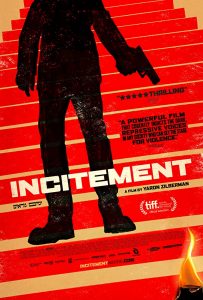
This occasionally-thrilling, though often-overwrought and somewhat overlong film detailing the 1995 assassination of Israeli Prime Minister Yitzhak Rabin, as told from the viewpoint of his killer, baffles as much as it illuminates. With the exception of a handful of scenes in which assassin Yigal Amir is discouraged by family and friends for his views and plans, his actions otherwise are more glorified than condemned, while the right-wing nature of his politics (and his reasoning for shooting Rabin) is shrilled all out of proportion, almost to the point of sheer annoyance. Filmmaker Yaron Zilberman’s treatment of the material is indeed odd, even if technically well orchestrated. But, despite this technical proficiency, one can’t help but wonder what exactly the director was going for here – or why there even needed to be a picture addressing this subject in this manner at this time. Quite a puzzle, to be sure.
14. “Memory House” (“Casa de antiguidades”) (Brazil/France)
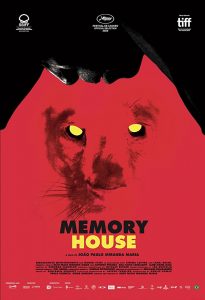
Ambitious, haunting and hypnotic but ultimately wildly unfocused, this debut feature from director João Paulo Miranda Maria tries to cover too much ground and ends up doing more to baffle viewers than to enlighten them. In this symbolic and surreal examination of the de facto state of colonialism existing in contemporary southern Brazil, the narrative attempts to explore the ethnic, sociopolitical and inequality issues affecting the region’s minority population as told through the eyes of a Black dairy worker. Ethereal imagery and inventive cinematography get the picture off to a promising start, but the film loses its way as it goes on, pursuing one unresolved tangent after another and eventually going completely off the rails in the final act. While it’s commendable that the filmmaker doesn’t spoon-feed his audience, he nevertheless seems to expect them to possess an intimate knowledge of Brazilian politics and culture to grasp his message. That may be fine for a screening to a regional viewership, but, for film festival or mainstream audiences outside Brazil, that’s expecting a lot from viewers just to be able to understand what he’s trying to say. In spite of these problems, however, the film somehow managed to capture the Roger Ebert Award in the Chicago Film Festival’s New Directors Competition.
15. “Sleep” (“Schlaf”) (Germany)

What starts out as an ambitious suspense tale turns tedious not far into the story as it introduces so many different unresolved tangents that it becomes difficult to decipher and even more of a chore to care about. With references to lucid dreaming, German folklore, and past and present right-wing German politics, director Michael Venus’s debut feature becomes so convoluted that it leans laughable when it’s not being a big bore (or “boar,” given its repetitive woodland animal imagery). What’s most regrettable, though, is that this supposed horror thriller fails to live up to its billing by coming up short on its primary mission – being scary, something it most definitely is not. Sadly, when watching a film becomes too much work to enjoy the experience, it’s really not worth the time or effort, and so it is with this big snooze.
16. “Sweat” (Sweden/Poland)

What makes us happy? And are those who are seemingly happy all the time truly the happiest? Those are the questions posed by “Sweat,” the story of a popular online fitness instructor who seems to have it all together, but does she really? In this age of omnipresent social media, that’s a critical question we all need to ask ourselves, and the film makes a valiant attempt at doing so, but it takes far too long to make its point, taking viewers through considerable seemingly irrelevant flotsam on its way there. While director Magnus von Horn’s second feature deservedly earned the Festival’s Silver Hugo Award for best art direction at the Chicago Film Festival, it’s rather hard to fathom that the film also captured the Gold Hugo Award as the Festival’s best feature (it’s simply not that good). Indeed, for a better cinematic exploration of the film’s central message, watch the vastly underrated American offering “Ingrid Goes West” (2017) instead.
17. “Emma” (UK)

Golden Globe Awards – nominee, best comedic actress (Anya Taylor-Joy)
Critics Choice Awards – nominee, best production design, best costume design, best hair and makeup
Unless you’re a diehard fan of the period piece comedy of manners genre, you’ll probably find director Autumn de Wilde’s version of Jane Austen’s classic novel about a self-absorbed genteel woman who fancies herself a matchmaker to be one of the most tedious and unengaging films you’ll ever watch. While the production is meticulously assembled in its costume design, art direction and cinematography, with a fine lead performance by Anya Taylor-Joy, the picture is otherwise emotionally flat and astoundingly boring, one that will challenge the patience of even the most tolerant moviegoers. The wit and humor that make this work succeed is virtually nonexistent here, with a bevy of well-dressed characters prattling on and on about relationships involving people most viewers are likely to care nothing about. Given the many versions of this story that have been made over the years, and in light of the substandard quality of this one, perhaps it’s time to give “Emma” a well-deserved rest for a while.
18. “The Assistant” (USA)
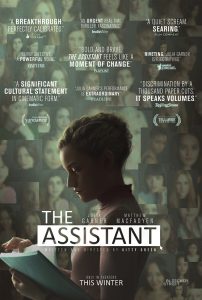
Independent Spirit Awards – nominee, best first screenplay, best cinematography, best actress (Julia Garner)
This tale of an entry-level movie company production assistant who’s witness to questionable behavior by her boss and considers blowing the whistle fizzles when it should sizzle. The message may be important, and Julia Garner’s lead performance may be reasonably compelling, but the film itself leaves much to be desired. Instead of offering new insight into a troubling industry problem (and any semblance of hope for the future), writer-director Kitty Green’s debut narrative feature stretches credibility by presenting an allegedly savvy protagonist who displays an astoundingly unbelievable degree of naïveté. What’s more, the supposedly “nuanced” evidence of the transgressions is so painfully obvious that any attempt at subtlety is obliterated. On top of all this, the film’s glacial pacing and inclusion of far too much extraneous padding make this an excruciatingly slow watch, even with its scant 1:27 runtime. This multiple Independent Spirit Award nominee has been vastly oversold in its restatement of the obvious with no adequate remedies for addressing its core issue. Watch “Bombshell” (2019) instead.
19. “Martin Eden” (Italy/France/Germany)

Loosely based on author Jack London’s 1909 novel of the same name, this Italian adaptation struggles to find its footing with an overly intellectualized narrative that attempts to fuse sociopolitical discussion with the merits of self-education and personal growth and development. Set in an indeterminate time in Italy’s history (though the 1970s would be a good guess), the film follows the odyssey of an angry young working class man with minimal schooling who seeks to improve himself and rise above his social status by ravenously reading and pursuing a writing career after meeting a bourgeois love interest. It’s a process that gradually turns him into an angrier young man when his vocational pursuits don’t pan out, leading to personal dissatisfaction, unwitting political turmoil and the dissolution of his forbidden romance – all of which ironically lead to his surprise recognition as a gifted scribe, unexpected success and a new round of individual disillusionment. While filmmaker Pietro Marcello’s second narrative feature outing is modestly interesting in the first half, it gradually starts to fall apart thereafter before completely losing it in the incoherent, overly dramatic final act. Don’t let the lavish praise heaped on this offering fool you. This one is vastly overrated, to be sure.
20. “To the Ends of the Earth” (“Tabi no owari sekai no hajimari”) (Japan/Uzbekistan/Qatar)

Take one part character study, one part campy comedy (although that may have been unintentional) and a whole vat full of schmaltz and you’ve got one searing mess of a movie. This Japanese offering about a clueless TV reporter for a cheesy travel show doing segments about life in Uzbekistan has more changes of mood and plot than Baskin-Robbins has flavors. Between her uncanny knack for perpetually failing at her work and finding herself in the wrong parts of town, a compelling but largely inexplicable urge to free a penned-up goat, her seemingly underwhelming romantic feelings for her boyfriend back home (except when it really counts), and an underdeveloped (and somewhat indifferent) attitude toward wanting to fulfill her ambition of becoming a singer, you’ve got dear, sweet, shrill, naïve protagonist who has no meaningful or apparent direction in her life (even though she always seems to feel the need to fearfully run wherever it is she’s trying to go at the moment). It’s pure, unadulterated ambling from start to finish. If anyone can tell me what director Kiyoshi Kurosawa was going for here, please explain it to me.
Forgettable (in no particular order)
“Coming Home Again” (USA/South Korea). Web site. Trailer.
“Citizens of the World”(“Lontano lontano”) (Italy). Web site. Trailer.
“Dreaming Grand Avenue” (USA). Web site. Trailer.
“Tommaso” (Italy/USA/UK/Greece). Web site. Trailer.
“Vitalina Varela” (Portugal). Web site. Trailer.
“Dreamland” (USA). Web site. Trailer.
“Three Summers” (“Três Verões”) (Brazil/France). Web site. Trailer.
“Little Joe” (Austria/Germany/UK/France). Web site. Trailer.
“The Tobacconist” (“Der Trafikant”) (Austria/Germany). Web site. Trailer.
“Tenet” (UK/USA). Web site. Trailer.
“Days of the Whale” (Colombia). Web site. Trailer.
“Never Rarely Sometimes Always” (USA/UK). Web site. Trailer.
Copyright © 2020-2021, by Brent Marchant. All rights reserved.

No comments:
Post a Comment